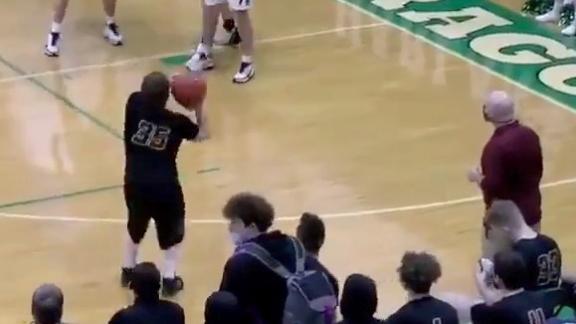Much as the selection committee tried, the NCAA tournament doesn't need any help generating madness. Put 64 teams on the field and strange things will happen.
To the surprise of, well, few as the first weekend of the NCAA tournament comes to a close, there is drama aplenty in the two regional sites that seemed unnecessarily loaded with talent when the bracket was released. No. 10 Michigan and No. 14 Tennessee are on the ropes at home, both one loss from elimination -- and the Wolverines are still around only after an epic sixth-inning rally against Notre Dame. Meanwhile, unseeded Kentucky and Oklahoma State remain unbeaten with two tries ahead of them to get the one win needed to reach super regionals.
But Ann Arbor and Knoxville are far from the only sites threatening to make a mess of brackets after smooth sailing on the first full day of play gave way to a perfect storm Saturday. Forced to play three games in one day after weather wiped out the schedule in Columbia, Mo., on Friday, No. 5 Missouri stands on the verge of elimination after DePaul stunned the Big 12 champion in 11 innings.
At least the Tigers are only on the precipice of disaster. In Austin, No. 3 Texas finds itself in the depressingly familiar position of discussing postseason disappointment before the first weekend is even over. The Longhorns, who exited the tournament at home a year ago on their second day, did the same after losing to Houston and Louisiana-Lafayette in the span of about 10 hours. Unseeded Houston is one win away from its second super regional appearance in the past four years -- two more than Texas in the same span.
It was a day that made the expected showcase, a winner's bracket game between defending national champion UCLA and No. 4 Florida in Gainesville, almost an afterthought after the Gators got seven strong innings from freshman pitcher Hannah Rogers in a 4-2 win.
So who are the teams that will wake up Sunday morning with a surprising amount of opportunity in their hands?
Oklahoma State (vs. No. 14 Tennessee): The numbers said Oklahoma State entered the postseason with exactly the wrong kind of momentum. Playing a Big 12 schedule every bit as arduous this season as anything offered by the Pac-10 or SEC, the Cowgirls lost their last six regular-season games. Worse still, they scored just 10 runs in those games, their worst such drought of the season. But after pulling out a 2-1 win against Georgia Tech on the first day of regional play, they broke loose in a 6-1 win against Tennessee on Saturday, becoming just the fourth team to beat the home team in Knoxville this season and scoring its most runs in more than a month in the process.
That Alysia Hamilton led the way with three hits and three RBIs, driving in one run apiece with a single, double and home run, was both predictable and perfect. Predictable because Hamilton is the team's best hitter this season, pacing it in slugging percentage, on-base percentage and batting average. Even during the largely team-wide offensive funk, she hit .438 during the six-game slide. And perfect because the senior lives up to the idea that if you give them enough time, numbers will eventually catch up to talent.
After she led the team in RBIs and posted an .849 OPS as a sophomore in 2009, Hamilton slumped, at least by the numbers, to a .277 batting average and .721 OPS as a junior. But one person's slump is another's run of bad luck.
"A lot of the time, you can hit the ball better and not get hits," Oklahoma State coach Rich Wieligman said earlier this season. "Her numbers weren't that bad from last year, but she's finding holes this year. I think she's hitting the ball better than she ever has, but they're also away from the defenders, where last year I think she hit it at them a lot."
Hamilton didn't stop being a good hitter last season, as she continues demonstrating this season. And Oklahoma State didn't stop being a good team just because it struggled to score runs at the end of the regular season.
Kentucky (vs. No. 10 Michigan): The Wildcats may feel they already earned the third win that would see them through, run-ruling Notre Dame on Friday and effectively beating No. 10 Michigan twice in the same game Saturday in Ann Arbor. Perilous though it was, watching a six-run lead in the final inning nearly vanish by the time Ashley Lane's grand slam brought Michigan within one run, the 7-6 win still said a lot about how far the Kentucky program has come in a short time under Rachel Lawson. The Wildcats had enough margin for error, if only barely, because of their offensive development -- the only time they scored as many as seven runs in an NCAA tournament game before this season was against Canisius in 2009. And with apologies to the Golden Griffins, they aren't Notre Dame or Michigan.
And yet with Saturday's win as an example, Lawson's toughest task in getting her program to the next round for the first time may be pulling the pitching strings at the right time.
After splitting starts as a freshman in 2009, Chanda Bell established herself as Kentucky's ace last season with an 18-15 record and 288 strikeouts in 218.1 innings. But she also gave up 34 home runs as a sophomore, helping to explain a modest 2.60 ERA despite opponents hitting just .199 against her. Fast forward to this season, and it's no coincidence that Bell entered Saturday's game with a 1.89 ERA and just 12 home runs allowed in 137 innings. Add it all up and last season she allowed 1.09 home runs per seven innings. Even after Lane's blast Saturday, she's allowing just 0.64 home runs per seven innings this season -- but that number is 1.07 per seven innings since April 1.
"When you're the type of power pitcher that she is, when you pitch a lot of innings, I think fatigue sets in," Lawson said earlier this season. "And for her, when she gets tired the ball lifts high -- when her legs get tired, the ball lifts high and that's usually hit for a home run."
Kentucky needs Bell on Sunday for all the reasons she showed in her first 11 innings in Ann Arbor. But with Rachel Riley and other viable options in reserve, how long it needs her could be the call that determines a season.
Houston (vs. Louisiana-Lafayette): With host Texas out of the mix in Austin, Houston and Louisiana-Lafayette will stage a rematch of a 2008 super regional that sent the Ragin' Cajuns to the Women's College World Series. Four seniors on the current Houston team played in that series, but only three of them did so with the Cougars. That's an interesting novelty when it comes to Donna Bourgeois, who pitched in relief for Louisiana-Lafayette in that 2008 series and transferred to Houston before this season, but it's also a clue as to how the Cougars got here, with a pair of Houston pitchers who won't finish their careers in the same uniforms in which they began and don't need to finish the games they start.
Unlike most teams at this stage, Houston doesn't even appear to be aiming for complete games from a talented pitching staff. Whether or not the two events are related, senior Amanda Crabtree, who was pitching for Oklahoma State when her current team reached the super regional in 2008, has been pitching in fragments since returning to the lineup after an injury kept her sidelined for more than two weeks late in the season. Necessity or strategy, the gambit seems to be working. In four postseason games, including two in the Conference USA tournament and two in Austin, no Houston pitcher has logged more than 4.2 innings in any game. That was taken to the extreme Saturday, with Bourgeois starting and throwing 65 pitches in 3.1 innings before yielding to Crabtree, who threw 62 pitches over the final 3.2 innings. And it's not like Crabtree, averaging 12.4 strikeouts per seven innings in four postseason games (compared to 12.3 overall this season), is struggling when she's in the game.
DePaul (vs. No.5 Missouri): What do you get with six hits in 18 innings against two of the best strikeout pitchers in college softball? If you're DePaul, you get within a win of a super regional. Sometimes it's a funny old game.
There's no denying the Blue Demons caught some truly remarkable breaks in pulling out their wins. They took advantage of three errors by Indiana to overcome Morgan Melloh's 11 strikeouts and score two runs while totaling just one official hit in the first game. And that was nothing compared to the day's second game against Missouri, in which the Tigers ran themselves out of a run-scoring opportunity in the top of the 11th inning (Rhea Taylor running from second on a fly out with one out) and the Blue Demons ran themselves into the win in the bottom of the inning (Alex Morocco coming home when Missouri catcher Megan Christopher left the plate unguarded after tagging out Brittney Yniguez). But it's also worth noting that in addition to making no mental errors on the bases, the Blue Demons didn't make any physical errors in the field in 18 innings. With pitchers Lindsay Dean, who went the distance against Indiana and the first 4.2 innings against Missouri, and Bree Brown combining for just 11 strikeouts -- half the total of Melloh and Thomas -- a lack of errors is just as impressive as an abundance of other numbers.
Editor's note: This wraps up the NCAA regional action as of 11 p.m. ET.




